Movies I Watched in April, Part 1
Once again, here's my reliably late recap of last month's movie watching:
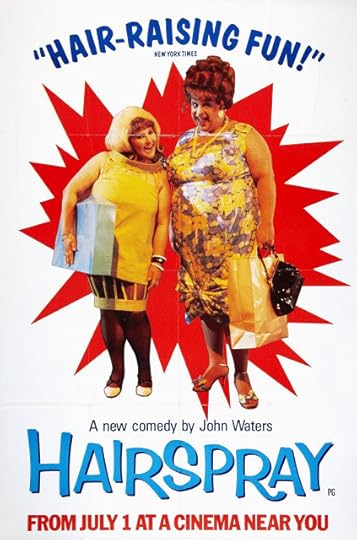
Back in my freshman year of college, when I stumbled, slack-jawed and shell-shocked out of a showing of "Pink Flamingos," I couldn't imagine showing a John Waters movie to a child, let alone my child. (Who, admittedly, I also couldn't imagine way back then.) Cut to last month, when I watched 1987's "Hairspray" with not only my nine-year-old daughter, but with my wife and mom as well. Of course, this period comedy about TV dance shows and Baltimore integration doesn't include Divine eating a fresh dog turd, as does "Pink Flamingos," but it does have a nice dose of edgy humor and, best of all, it does include Divine in all his cross-dressing glory (plus a small male-clothed bit as the racist owner of the TV station.) What's most shocking, though, is how warmhearted the whole thing is, with likable characters and an incredible vintage soundtrack, plus a cast that includes Ricki Lake, Debbie Harry, Sonny Bono, Jerry Stiller and Waters himself in a cameo role. It's the rare John Waters movie that's -- dare I say it -- fun for the whole family.
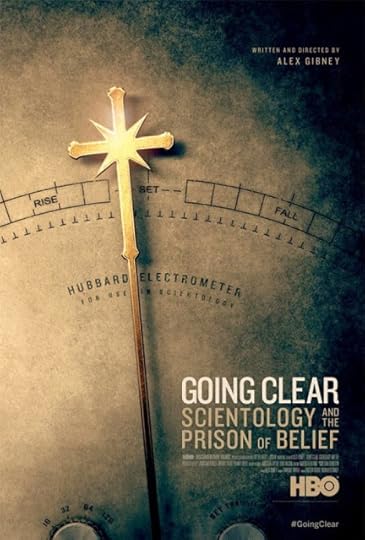
I read Lawrence Wright’s book of the same name a year ago, so many of the jaw-dropping revelations about Scientology (and trust me, they are indeed jaw-dropping) didn’t surprise me, but Alex Gibney’s notorious doc gains considerable power from the fact that you actually see these people tell their own stories and, even better, you get to watch genuine Scientology promotional videos that, though designed to put the church in the best possible light, are instead horrifying, hilarious glimpses into one very strange organization. As a documentary, it’s fascinating but exhausting, throwing so much information at the viewer it simple wears you down after a while. But as a study of human nature gone horribly, terribly wrong, it’s a must-see. Hell, the footage of L. Ron Hubbard’s birthday party (years after his death) is worth the price of admission alone. Not however, the best HBO documentary I saw in April. Turn in for the next installment to see what that was.
And now we enter the prestigious Oscar section of the recap, wherein I watch movies I should, by all accounts, have watched before the Academy Awards were, well, awarded. But those “Kojak” DVDs and “Naked and Afraid” reruns weren't going to watch themselves, so I’m only now getting around to these prestigious bits of Oscar bait. Sue me.
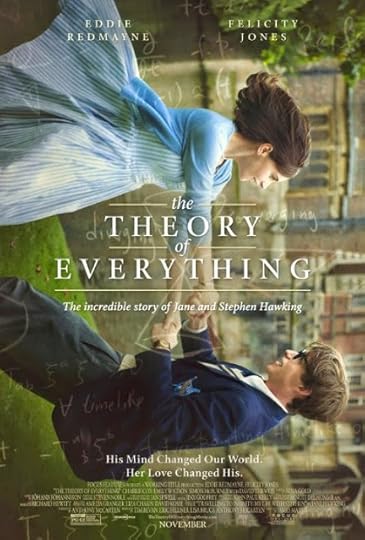
“The Theory of Everything” was a solid heartwarming biopic, just the sort of thing you expect to arrive in theaters in late December or early January. Though its lead actors, Eddie Redmayne and Felicity Jones, are excellent as Stephen and Jane Hawking (especially Redmayne), the whole movie had sort of a by-the-numbers feel, with the great-man-succeeds-thanks-to-loving-woman template pushed down so hard it sanded all the rough edges right off the movie. (Enough strained metaphors in that last sentence for you?) Still, I appreciated how director James March (who also directed one of my favorite documentaries of the last several years, “Man on Wire”) managed to give "Theory" a sort of trippy feel that helped convey both Hawking’s mind-bending ideas and the surreal transformation of his body. Good movie? Sure. Great movie? Well…
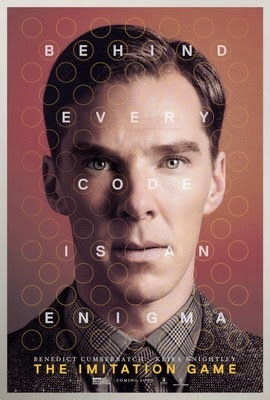
And, despite being about a completely different (though equally real-life) person, “The Imitation Game” somehow felt cut from the same cloth. Benedict Cumberbatch, who’s no stranger to playing socially awkward braniacs, is naturally top notch as ace codebreaker Alan Turing, and he’s surrounded by a strong cast, but like “The Theory of Everything,” it all feels like something we’ve seen before. (And I’m not talking about “Enigma,” which is a fictionalized version of the same story.) You’ve got the team coming together, the supervisor who doesn’t trust them, the last minute stroke of genius and the flashbacks to the hero’s past that somehow explain everything. And as for the subplot about Turing’s homosexuality? It’s there, but somehow, it’s included in yet another storyline (three alternating time periods is a bit too much for a movie like this) that never quite connects with the others. Not exactly bad, but not exactly good, either. And, according to DVD Savant Glenn Erickson’s excellent review, it plays pretty fast and loose with the historical record.
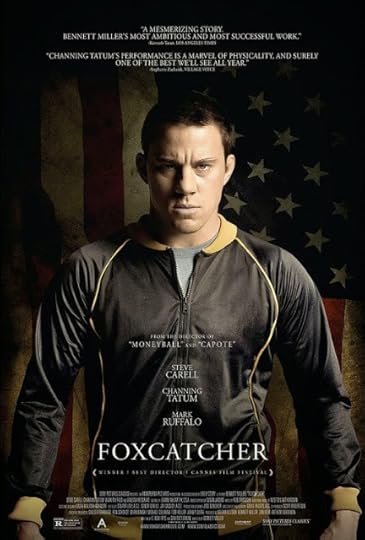
Now, this, this is the best Oscar-oriented movie I saw last month, despite the fact that it wasn’t nominated for a Best Picture award. (Actors Steve Carell, Mark Ruffalo, director Bennett Miller and the screenwriters were, though). Unlike “The Imitation Game” and “The Theory of Everything,” “Foxcatcher” is a tense, unnerving and, best of all, strange little movie that enters a creepy place and stays there for the durationn. Carell plays rich weirdo John du Pont, who is determined to finance (and inspire) a team of wrestlers who can bring home an Olympic gold medal. He recruits Mark Schultz (Channing Tatum) as a top prospect, then brings in his brother David (Ruffalo), a move that also unearths decades of sibling rivalry and unresolved conflicts between the two. It’s an intense drama, gaining power from its refusal to leave a confined space (even the competition scenes feel claustrophobic) and instead forces us to get closer and closer to its troubled characters. And, as good as Carell and Ruffalo are – and they’re very, very good – Channing Tatum is the MVP here, using his body to convey a character with troubled that go deep, deep down.
Coming up next: BLAAAAAAAART!

Back in my freshman year of college, when I stumbled, slack-jawed and shell-shocked out of a showing of "Pink Flamingos," I couldn't imagine showing a John Waters movie to a child, let alone my child. (Who, admittedly, I also couldn't imagine way back then.) Cut to last month, when I watched 1987's "Hairspray" with not only my nine-year-old daughter, but with my wife and mom as well. Of course, this period comedy about TV dance shows and Baltimore integration doesn't include Divine eating a fresh dog turd, as does "Pink Flamingos," but it does have a nice dose of edgy humor and, best of all, it does include Divine in all his cross-dressing glory (plus a small male-clothed bit as the racist owner of the TV station.) What's most shocking, though, is how warmhearted the whole thing is, with likable characters and an incredible vintage soundtrack, plus a cast that includes Ricki Lake, Debbie Harry, Sonny Bono, Jerry Stiller and Waters himself in a cameo role. It's the rare John Waters movie that's -- dare I say it -- fun for the whole family.

I read Lawrence Wright’s book of the same name a year ago, so many of the jaw-dropping revelations about Scientology (and trust me, they are indeed jaw-dropping) didn’t surprise me, but Alex Gibney’s notorious doc gains considerable power from the fact that you actually see these people tell their own stories and, even better, you get to watch genuine Scientology promotional videos that, though designed to put the church in the best possible light, are instead horrifying, hilarious glimpses into one very strange organization. As a documentary, it’s fascinating but exhausting, throwing so much information at the viewer it simple wears you down after a while. But as a study of human nature gone horribly, terribly wrong, it’s a must-see. Hell, the footage of L. Ron Hubbard’s birthday party (years after his death) is worth the price of admission alone. Not however, the best HBO documentary I saw in April. Turn in for the next installment to see what that was.
And now we enter the prestigious Oscar section of the recap, wherein I watch movies I should, by all accounts, have watched before the Academy Awards were, well, awarded. But those “Kojak” DVDs and “Naked and Afraid” reruns weren't going to watch themselves, so I’m only now getting around to these prestigious bits of Oscar bait. Sue me.

“The Theory of Everything” was a solid heartwarming biopic, just the sort of thing you expect to arrive in theaters in late December or early January. Though its lead actors, Eddie Redmayne and Felicity Jones, are excellent as Stephen and Jane Hawking (especially Redmayne), the whole movie had sort of a by-the-numbers feel, with the great-man-succeeds-thanks-to-loving-woman template pushed down so hard it sanded all the rough edges right off the movie. (Enough strained metaphors in that last sentence for you?) Still, I appreciated how director James March (who also directed one of my favorite documentaries of the last several years, “Man on Wire”) managed to give "Theory" a sort of trippy feel that helped convey both Hawking’s mind-bending ideas and the surreal transformation of his body. Good movie? Sure. Great movie? Well…

And, despite being about a completely different (though equally real-life) person, “The Imitation Game” somehow felt cut from the same cloth. Benedict Cumberbatch, who’s no stranger to playing socially awkward braniacs, is naturally top notch as ace codebreaker Alan Turing, and he’s surrounded by a strong cast, but like “The Theory of Everything,” it all feels like something we’ve seen before. (And I’m not talking about “Enigma,” which is a fictionalized version of the same story.) You’ve got the team coming together, the supervisor who doesn’t trust them, the last minute stroke of genius and the flashbacks to the hero’s past that somehow explain everything. And as for the subplot about Turing’s homosexuality? It’s there, but somehow, it’s included in yet another storyline (three alternating time periods is a bit too much for a movie like this) that never quite connects with the others. Not exactly bad, but not exactly good, either. And, according to DVD Savant Glenn Erickson’s excellent review, it plays pretty fast and loose with the historical record.

Now, this, this is the best Oscar-oriented movie I saw last month, despite the fact that it wasn’t nominated for a Best Picture award. (Actors Steve Carell, Mark Ruffalo, director Bennett Miller and the screenwriters were, though). Unlike “The Imitation Game” and “The Theory of Everything,” “Foxcatcher” is a tense, unnerving and, best of all, strange little movie that enters a creepy place and stays there for the durationn. Carell plays rich weirdo John du Pont, who is determined to finance (and inspire) a team of wrestlers who can bring home an Olympic gold medal. He recruits Mark Schultz (Channing Tatum) as a top prospect, then brings in his brother David (Ruffalo), a move that also unearths decades of sibling rivalry and unresolved conflicts between the two. It’s an intense drama, gaining power from its refusal to leave a confined space (even the competition scenes feel claustrophobic) and instead forces us to get closer and closer to its troubled characters. And, as good as Carell and Ruffalo are – and they’re very, very good – Channing Tatum is the MVP here, using his body to convey a character with troubled that go deep, deep down.
Coming up next: BLAAAAAAAART!
Published on May 08, 2015 08:31
No comments have been added yet.
Will Pfeifer's Blog
- Will Pfeifer's profile
- 23 followers
Will Pfeifer isn't a Goodreads Author
(yet),
but they
do have a blog,
so here are some recent posts imported from
their feed.



